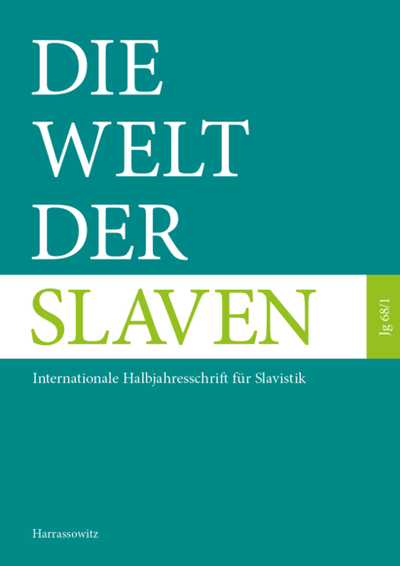Sprachliche Manifestation soziokultureller Zugehörigkeiten bei deutsch-ukrainischer Literaturübersetzung
DOI:
https://doi.org/10.13173/WS.68.1.164Schlagwörter:
Übersetzungsstil, Übersetzungsstrategie, soziokultureller Einfluß, PostkolonialismusAbstract
Der Artikel befasst sich mit sozialen, kulturellen und politischen Faktoren, die Übersetzungslösungen im deutsch-ukrainischen Kontext beeinflussen. Ausgehend von der Analyse des biografischen Hintergrunds zweier ukrainischer Übersetzer Petro Taraščuk und Jurij Prochasʹko, ihrer Äußerungen in der Öffentlichkeit, Interviews und ihrer Übersetzungsstrategien werden die Merkmale ihrer Übersetzerpersönlichkeiten aus anti-/ post-/imperialer vs. postkolonialer Perspektive chrakterisiert. Als Material dienen Übersetzungen von Romanen Der Prozess und Amerika/Der Verschollene von Franz Kafka ins Ukrainische. Taraščuks Übersetzungsstrategie wird als Nativismus und die Strategie von Prochasʹko als Westernisierung beschrieben.
Literaturhinweise
Baumann, Gerhart. 1990. Kafkas ‚Schloß‘-Roman: Das parasitäre Spiel der Zeichen. In Neumann, Gerhard & Kittler, Wolf (Hg.), Franz Kafka: Schriftverkehr, 199–221. Freiburg.
Belobratow, Alexander W. 2006. Kafka und die künstlerische Avantgarde. Europäische Begegnungen: Beiträge zur Literaturwissenschaft, Sprache und Philosophie. (Hg. v. S. Craemer u. a.) Luxembourg.
Braun, Helmut (Hg.). 2006. Czernowitz: Die Geschichte einer untergegangenen Kulturmetropole. Berlin.
Deleuze, Gilles & Guattari, Felix & Kroeber, Burkhart. 1976. Kafka: Für eine kleine Literatur. Frankfurt am Main.
Even-Zohar, Itamar. 2000. The position of translated literature within the literary polysystem. In Venuti, Lawrence (ed.), The translation studies reader, 192–197. London.
Farion, Iryna. 2004. Pravopys – korset movy? Ukrajinsʹkyj pravopys jak kulʹturno-polityčnyj vybir. Lʹviv.
Göbner, Ralf. 1980. Eine beispiellose Hochzeit: Ukrainische Erzählungen aus neun Jahrzehnten. Berlin.
Hnatiuk, Olga. 2003. Pożegnanie z imperium: Ukraińskie dyskusje o tożsamości. Lublin.
Hofeneder, Philipp. 2013. Die mehrsprachige Ukraine: Übersetzungspolitik in der Sowjetunion von 1917 bis 1991. Wien.
Ivanyšyn, Petro. 2005. Nacionalʹno-ekzystencialʹna interpretacija (osnovni teoretyčni ta prahmatyčni aspekty). Drohobyč.
Kafka. Franz. 2002. Der Prozess: Roman. Frankfurt am Main.
Kafka, Franz. 2008. Proces: Roman. (Per. z nim. P. Taraščuka.) Charkiv.
Kafka, Franz. 2002. Der Verschollene: Roman. Frankfurt am Main.
Kafka, Franz. 2009. Znyklyj bezvisty: Roman. (Per. z nim. Jurka Prochasʹka.) Kyїv.
Masenko, Larysa. 2004. Mova i suspilʹstvo: Postkolonialʹnyj vymir. Kyїv.
Najenko, Mychajlo. 2002. „Vidvernuly … kulʹturnu smertʹ Ukraїny“: Pro antolohiju Ju. Lavrinenka „Rozstriljane vidrodžennja“. In Göbner, Rolf & Kratochvil, Alexander (Hg.), Ukrainische Kultur im europäischen Kontext, 63–69. Greiswald.
Nečuj-Levyckyj, Ivan. 1998. Ukraїnstvo na literaturnych pozvach z Moskovščynoju: Kulʹturolohični traktaty. Lʹviv.
Pavlyshyn, Marko. 1992. Post-colonial features in contemporary Ukrainian culture. Austrian Slavonic and East European Studies 6(2). 9–24.
Prochasʹko, Jurko. 2010. Jakisnyj pereklad vede do rozvytku ukrajinsʹkoï movy. Čytomo. http://archive.chytomo.com/interview/yurko-prokhasko-yakisnyy-pereklad-vede-do-rozvytku-ukrayinskoyi-movy (abgerufen 25.07.2022).
Rjabčuk, Mykola, 2011. Postkolonialʹnyj syndrom: Sposterežennja. Kyїv.
Said, Edward. 1993. Culture and imperialism. New York.
Savčyn, Valentyna. 2014. Mykola Lukaš — podvyžnyk ukrajinsʹkoho chudožnʹoho perekladu. Lʹviv.
Shkandrij, Myroslav. 2001. Russian and Ukraine: Literature and the discourse of empire from Napoleonic to postcolonial times. Montreal.
Simonek, Stefan (Hg.). 2006. Versperrte Tore: Ukrainische Autoren und Wien. Passau.
Szporluk, Roman. 2000. Russia, Ukraine and the breakup of the Soviet Union. Stanford.
Taraščuk, Petro. 2006. Ne kulʹtury borjutʹsja miž soboju, a kulʹturu vykorystovujutʹ jak instrument borotʹby. Chreščatyk 39. http://kreschatic.kiev.ua/ua/2834/art/1258050964.html (abgerufen 07.03.2020).
Taraščuk, Petro. 2010. Ne možu stverdžuvaty, niby ja žrecʹ u chrami nabokoviany… Art-vertep. http://artvertep.com/news/10184 (abgerufen 25.07.2022).
Terdiman, Richard. 1985. Discourse/counter-discourse: The theory and practice of symbolic resistance in nineteenth-century France. Ithaca.
Thompson, Ewa M. 2000. Imperial knowledge: Russian literature and colonialism. Westport (Conn.).
Tkačenko, Vsevolod. 2013. Šanujmo klasykiv. Ukraїnsʹka literaturna hazeta. 02.04.2013. https://litgazeta.com.ua/articles/shanujmo-klasykiv/ (abgerufen 25.07.2022).
Wolf, Michaela. 2012. Die vielsprachige Seele Kakaniens: Übersetzen und Dolmetschen in der Habsburger Monarchie 1848–1918. Wien.
Zavhorodnja, Inna. 2013. Perekladači z nimecʹkoï: Jurko Prochasʹko. Deutsche Welle. http://dw.de/p/188FF (abgerufen 25.07.2022).
Zorivčak, Roksolana. 2005. Ukraïnsʹkyj chudožnij pereklad jak nacijetvorčyj čynnyk. Literaturna Ukraïna, 13.01.2005.

